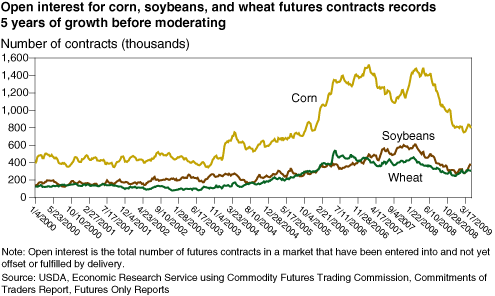New Traders in Corn, Soybean, and Wheat Futures Markets Scrutinized
- by Linwood Hoffman, Nicole Aulerich and Gerald Plato
- 12/1/2009
Recent price volatility in agricultural markets heightened interest in the use of futures markets by farmers, elevator operators, and processors to manage price risk. Other traditional traders in futures markets, such as speculators, and new traders, such as index funds and swap dealers, have been attracted to futures to make profits or as part of diversified investment strategies. This growing interest coincided with historic price increases for many commodities and a dramatic surge in trading of agricultural futures. The additional trading led to concerns that changes in the composition of traders, and particularly the growth of nontraditional traders, contributed to movements in commodity prices not associated with underlying supply and demand forces at the time.
Most of the concern about the impact of nontraditional traders arose because cash prices for the underlying commodities were not moving over time with futures prices as expected. Besides a correlation between cash and futures prices movements, it is also expected that the difference in cash and futures prices will narrow as the delivery period for futures contracts approaches, a process known as “convergence.” Given the option to deliver the physical commodity in fulfillment of most agricultural futures contracts, the process of arbitrage—the simultaneous purchase and sale of cash and futures contracts to benefit from a difference in price relationships—normally ensures that cash and futures prices move together and converge as expected. Farmers, processors, and bankers were particularly concerned that expected relationships between cash and futures prices had weakened substantially, and that the use of futures as a risk management tool was compromised.
Motivated by these concerns, researchers at ERS are investigating if any specific group of traders has contributed to systemic changes in relationships between cash and futures prices. ERS researchers found no clear statistical evidence that any particular trader type has caused commodity price movements or volatility changes. Ongoing research will test for any causal relationships between selected trader positions and changes in price levels and price volatility. ERS also is investigating why convergence of cash and futures has weakened and what changes in futures contract design or regulation of futures trading may improve the performance of agricultural futures markets.
This article is drawn from:
- Aulerich, N. & Hoffman, L. (2009). Issues and Prospects in Corn, Soybeans, and Wheat Futures Markets. U.S. Department of Agriculture, Economic Research Service. FDS-09G-01.
You may also like:
- Wheat Data. (n.d.). U.S. Department of Agriculture, Economic Research Service.
- Corn and Other Feed Grains. (n.d.). U.S. Department of Agriculture, Economic Research Service.
- Feed Grains Database. (n.d.). U.S. Department of Agriculture, Economic Research Service.
- Soybeans and Oil Crops. (n.d.). U.S. Department of Agriculture, Economic Research Service.
- Wheat. (n.d.). U.S. Department of Agriculture, Economic Research Service.


